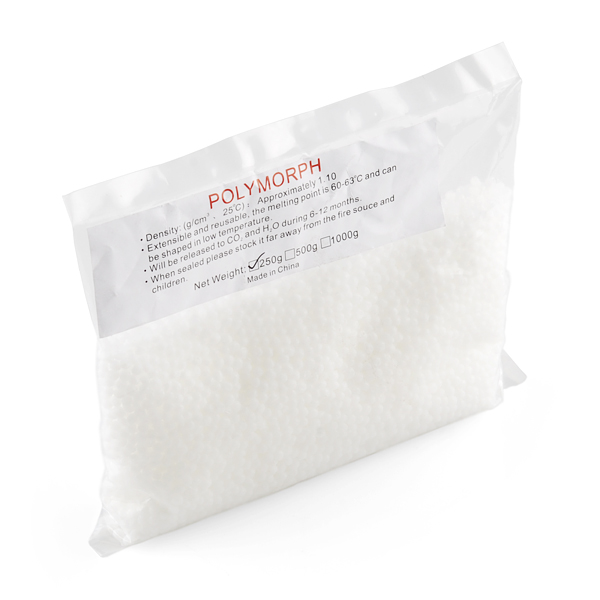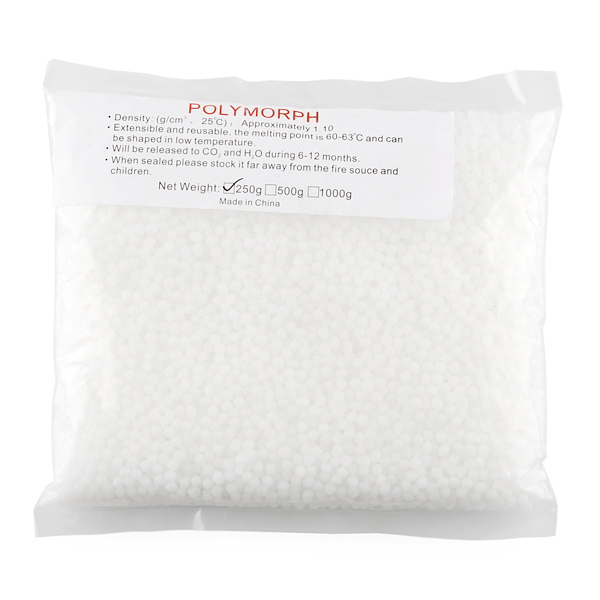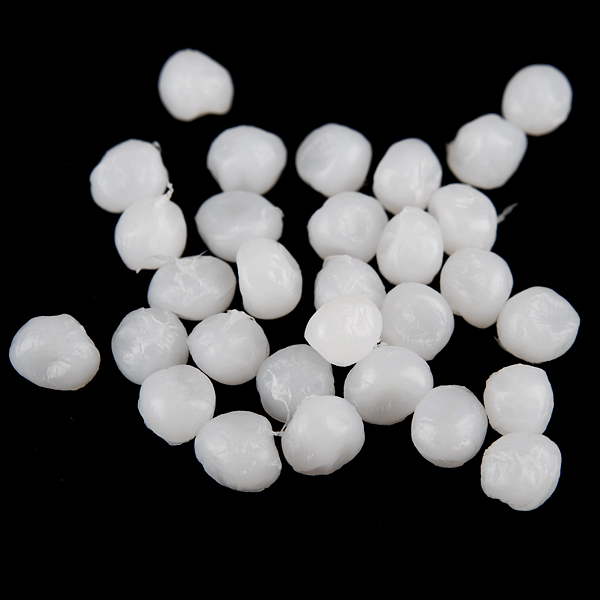Polymorph - 250g
Polymorph is a non-toxic, biodegradable polyester with a low melting temperature of about 60°C (140°F). Prototype plastic parts can be made by simply heating the plastic beads in hot water until they turn clear and then kneading them together and shaping by hand. When it cools it becomes a nylon-like white plastic. Polymorph can be re-used by simply re-heating and re-shaping. Plastic beads are supplied in a heat-sealed plastic bag to prevent spillage during transport.
So what do you do with it? Robotics, small-parts prototyping, arts/crafts, there's almost no end to what you can do with this stuff. We had a blast playing with it here at SparkFun. Try embedding LEDs into it for a cool diffuse glow effect.
Note: Although Polymorph melts at around 60°C (140°F), it is more workable at hotter temperatures, like around 180-200°F.
Weight: 250g
- Non-toxic, biodegradable polyester
- Low melting temperature of about 60°C (140°F)
- Useful for many type of robots
- Can be melted and re-used over and over
Polymorph - 250g Product Help and Resources
1 of 1 found this helpful:
Useage tip
Pro tip: “You can make it to any shape you want using anything you want as a mold, just put aluminium foil between the polymorph and the shape. The polymorph won’t stick to the aluminum foil.”
Core Skill: DIY
Whether it's for assembling a kit, hacking an enclosure, or creating your own parts; the DIY skill is all about knowing how to use tools and the techniques associated with them.
Skill Level: Noob - Basic assembly is required. You may need to provide your own basic tools like a screwdriver, hammer or scissors. Power tools or custom parts are not required. Instructions will be included and easy to follow. Sewing may be required, but only with included patterns.
See all skill levels
Comments
Looking for answers to technical questions?
We welcome your comments and suggestions below. However, if you are looking for solutions to technical questions please see our Technical Assistance page.
Customer Reviews
4.3 out of 5
Based on 3 ratings:
Awesome product !
I first say the shipping of mu order was really fast, so that was great.
The polymorph is a very unique product. I love the way it so easily converts to other forms.
It is very pliable and easy to work with and mold to other shapes. It maybe sets or solidifies too fast. But then it is just as easy to re-shape it. In a nut shell, I love it. Lots of fun working with it. I would purchase it again if the need arises. Thank you, Janice
The good stuff.
Easy to work with, easy to clean up, reusable, sturdy. Good for projects that you don't have time to make a good enclosure for.
Love this stuff
I've repaired a visor in my car, flash stand, bottle cap and now made some shelf brackets for a cabinet in the kitchen. This stuff is great to play and work with




On the bag I just purchased, one of the messages states "Will be released to CO2 and H2O during 6-12 months". What does this mean? Will it decompose over time into those gasses?
"How to Use Polymorph" (above) can also be used as a post-doctoral course in Chinglish.
I think you mean: "To also Utilize Engrish is the Polymorph instructing apartment."
LOLOLOLOLOL
I'm suprised that isn't in there. "While plastic containers like discarded if so, nor the loss What:" WTF.
What I find interesting is that they have a college-level electronics textbook that's clearly written in English (Bogart's "Electronic Devices and Circuits, Third Edition" to be specific) avaiable to be used as a weight for their glass mold demo. That implies that at least one person working there can understand English, at least in written form, at an approximately 12th grade level or higher. Why wasn't that person involved in writing this document? Sure, I'd still expect some unusual turns-of-phrases and similar linguistic oddities, but not nearly at the level displayed in the linked documents.
"At this time can be recruited Jiedao cut into the profile you want to"
Did not survey the place, you can use iron to amend or beautification
"stir well to become the state diagram." LOL
I have tried a few things with this, and I want to share what I found. If you try to press this into shapes using anything plastic IE two CD covers, you will simply bind them together, to the point I recommend you use this to bind together other pieces of preexisting plastics. But, if you want to use an object to press the polymorph into a shape and then remove the object, simply cover it with aluminum foil first, it doesn't stick to it one bit.
Can you dye the polymorph? maybe color the beads with a marker before melting? or will the ink cause weakness. maybe a highlighter? UV reactive polymorph would be pretty awesome!
I too wish to know this
It colors really well with a powdered pigment- I just tried some in the breakroom, and it took the color REALLY well.
I find the hot water annoying, so I heat it up in the microwave. Just watch for it to go transparent and go a tad past that. It's easy to superheat it though, so be careful!
Here's a cool robot structure built of Polymorph. Swashbot3: http://www.youtube.com/watch?v=c4kk3lfoTuI ShapeLock is a name brand variation of polymorph.
Any time I try and make a mold for this, or shape it for something, it sticks and I cant get it off. I have tried Pam non stick spray, but it still sticks to stuff like hot glue. Someone help?
I've used/have the shapelock brand/version. Like it a lot.
Flat sheets reheat quick, but its possible to trap water are air in it when kneading it.
Legos make great molds (though if too hot it can stick. cooking spray should help)
Well, I bought this product and it works as expected. I had a plastic protector on my laptop(a Pavilion dm4) break when I accidentally dropped it. Urgent to fix it, I bought the polymorph and hot air reworked it onto the broken piece. The new joint is now much stronger. Product works as expected.
I see that the instructions and everybody says to use boiling / hot water to form the plastic. Is it just as shapeable without the water? Will simply heating it up work?
I want to use the polymorph to make formwork for small-scale concrete projects. If I use the polymorph to create hallow spaces in concrete, will it be possible heat the polymorph up inside of the concrete to the point that it can be retrieved or pulled out? Will the heat produced by concrete's curing process affect the polymorph?
Thanks
I vote this to be a candidate for a spark fun style instructional manual.
So what is the English translation of the Chinglish phrase: "Will be released to CO2 and H20 during 6-12 months"? They are not saying that in about a year the plastic will turn into carbonated water are they?!? Or is this just saying that there will be some outgassing over time?
Just to let you or anyone else concerned with the decomposition know, I've left some in a ziploc bag since Christmas (6 months ago), and just took it out again to patch up a broken RC helicopter, and it worked great and I didn't notice any decomposition.
I think any outgassing would be due to being heated in water (per the recommended method to get this stuff into a moldable condition). My theory is as it is heated it just absorbs some of the surrounding water and perhaps CO2 dissolved in the water. Then after the Polymorph cools the water and CO2 are slowly released. It's just an educated guess, but it seems plausible.
I trust the people at Sparkfun enough to mention it in the product description if this material is likely decompose in such a dramatic fashion within a year.;) Therefore, it's probably a reference to outgassing CO2 and water vapor. If so, I guess it's useful to know about it for some applications, like DIY housings for humidity monitors or C02 gas sensors.
Lol... the fish is perfect, but I do believe the translator failed for "mouse".
Saw something like this at Princess Auto (surplus section FTW). It was red, and only in a 100g bag for the same price. I think this is the better deal if going by price alone :)
I'd love to see some youtube links for things you've made with this.
this stuff is pretty amazing. Just got my package from SF today and tried it out at work using the hot water from my water cooler and it melted easily and was easily formable. I could also color it easily using permanent markers.
Assuming it is less than 140 outside (say 120 because it gets hot inside of a car), would polymorph stay completely solid (no shape changing even over a long time)?
Generally plastics "creep" slowly at temperatures below their melting point, causing them to deform over time. I would imagine this would be subject to that kind of behavior.
Also, I think it gets even hotter than 140f inside a car from time to time. A quick google showed that it can get above 120f even when its just 80 degrees out.
So its 250g... If it were molded into a solid block, how much volume would it have?
the density of this is about 1.1, so it would occupy about 227 cm3 or ml.
Man, this stuff sounds EXACTLY like ShapeLock. Is it?
Not exactly. Shapelock is a brand of polymorph plastic. This is just the generic stuff. Same thing - http://en.wikipedia.org/wiki/Polycaprolactone